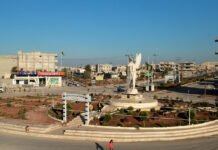Syrian refugees have been struggling with unemployment, crumbling infrastructure and dangerous living conditions after being returned to Syria through Turkey’s “voluntary return project,” the Evrensel daily reported.
Since Hay’at Tahrir al-Sham (HTS) assumed control of parts of Syria in December 2024 after the ouster of Bashar al-Assad, some 411,649 Syrians have returned, according to Turkey’s Presidency of Migration Management. Turkish authorities describe these returns as voluntary, but many Syrians argue they were driven by economic hardship, social pressure and a lack of safety, only to face even harsher conditions upon their return home.
One Syrian man named Nihat, who returned to Aleppo after 12 years in Turkey, said in an interview with Evrensel that there was no electricity, no water, no work. “There’s no future here. In Turkey we started from zero. Here, zero might even be a big number. Here, it’s not even zero. It’s negative, negative beyond measure,” he said.
“Water and electricity exist for only five or six hours a day. Today there was no electricity at all. Solar panels only run the fridge, and we unplug it at night. When there’s no water, we carry it in buckets,” Nihat explained. “The house belongs to us, but what good is an empty house? There’s no work, no water, no electricity. Without those, you can’t say life exists. Even the municipality only collects our trash once a week, and sometimes they ask for payment for that.”
HTS’s Ministry of Energy has announced plans to increase electricity production from 1,500 to 2,500–3,000 megawatts using 3.4 million cubic meters of gas transported daily from Azerbaijan via Turkey, which would allow up to 10 hours of electricity per day. But even this improvement would fall far short of a continuous 24-hour supply.
Nihat said many who returned regret their decision for similar reasons. He sought a way to return to Turkey shortly after coming back, but found the passport office crowded with others seeking to leave.
Similar to the desperation of returnees, Syrians remaining in Turkey also face mounting pressures. Muhammed, a shop owner in southern Adana province, said he planned to return to Syria in a few months despite knowing the conditions there.
“We are mentally exhausted. Even if we don’t go, the authorities could stop us on the street and send us to a repatriation center. Being involved in a single fight could be enough for us to be returned,” he said. Muhammed said Syrians were blamed for all the social and economic troubles in Turkey and that people were forced into “voluntary” return.
Twenty-five-year-olds Halit and Hasan also said they wanted to return due to the discrimination they have experienced in Turkey, but they were worried about living conditions in Syria. “Relatives warn us not to come back,” they said.
Turkey has granted legal status to approximately 3.5 million Syrian nationals who fled the civil war that began in 2011. Initially welcomed under a temporary protection policy, many Syrians settled in Turkish cities, sparking debates about integration, economic strain and cultural differences.
Turkish President Recep Tayyip Erdoğan introduced the voluntary return project in 2023 when he said 1 million Syrian refugees would return home voluntarily. The statement came amid rising anti-migrant sentiment across the country, with opposition parties demanding the return of Syrians.However, reports have revealed that many Syrians were forced to sign voluntary return documents. Migration experts have warned against the voluntary return project, saying the government should focus on developing better integration policies rather than sending refugees back to Syria where they face deteriorating conditions.















